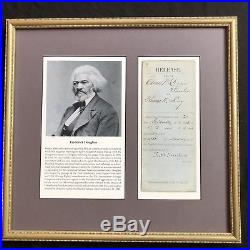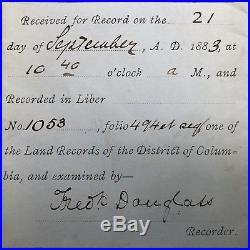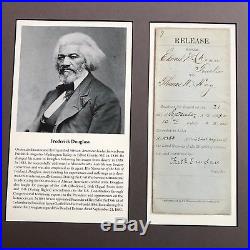1883 Framed FREDERICK DOUGLASS SIGNED Deed of Release BLACK AMERICANA Slavery




1883 beautifully Framed Deed of Release signed by ABOLITIONIST, former slave, Civil Rights Leader and orator FREDERICK DOUGLASS!! An important piece of post Civil War BLACK AMERICANA from likely the most important African American in history! SEE PHOTO-----COMPLETE, ORIGINAL Deed of Release, signed by FREDERICK DOUGLASS on September 21, 1883 while serving as the Recorder of Deeds in Washington, DC, making him one of the highest ranking African American Officials in the United States at the time. A fine CENTERPIECE to any quality BLACK AMERICANA collection. Framed under Ultra Violet (UV) protective MUSEUM GLASS, the most protective glass available for UV protection!
The Freedman's Savings Bank went bankrupt on June 29, 1874, just a few months after Douglass became its president in late March. During that same economic crisis, his final newspaper, The New National Era, failed in September. Hayes was elected President, Douglass accepted an appointment as United States Marshal for the District of Columbia, which helped assure his family's financial security. In 1877, Douglass visited Thomas Auld, who was by then on his deathbed, and the two men reconciled. Douglass had met Auld's daughter, Amanda Auld Sears, some years prior; she had requested the meeting and had subsequently attended and cheered one of Douglass' speeches.
Her father complimented her for reaching out to Douglass. The visit also appears to have brought closure to Douglass, although some criticized his effort. That same year, Douglass bought the house which was to be the family's final home in Washington D.
On a hill above the Anacostia River. He and Anna named it Cedar Hill (also spelled CedarHill).
They expanded the house from 14 to 21 rooms, and included a china closet. The home is now preserved as the Frederick Douglass National Historic Site. In 1881, Douglass both published the final edition of his autobiography, The Life and Times of Frederick Douglass, and received another political appointment, as Recorder of Deeds for the District of Columbia.
However, Anna Murray-Douglass died in 1882, leaving the widower devastated. After a period of mourning, Douglass found new meaning from working with activist Ida B.
He also remarried in 1884, as mentioned above. Douglass also continued his speaking engagements and travel, both in the United States and abroad. With his new wife, Helen, Douglass traveled to England, Ireland, France, Italy, Egypt and Greece from 1886 to 1887. Douglass also became known for advocating Irish Home Rule and supported Charles Stewart Parnell in Ireland. At the 1888 Republican National Convention, Douglass became the first African American to receive a vote for President of the United States in a major party's roll call vote. That year, Douglass spoke at Claflin College, a black college in Orangeburg, South Carolina, and the oldest such institution in the state. Many African Americans, called Exodusters, escaped the Klan and racially discriminatory laws in the South by moving to large northern cities, as well as to places like Kansas where some formed all-black towns to have a greater level of freedom and autonomy.Douglass did not favor this, nor the Back-to-Africa movement, which he thought resembled the American Colonization Society he had fought in his youth. In 1892, at an Indianapolis conference convened by Bishop Henry McNeal Turner, Douglass spoke out against the separatist movements, urging blacks to stick it out. He made similar speeches as early as 1879, and was criticized both by fellow leaders and some audiences, who even booed him for this position. Speaking in Baltimore in 1894, Douglass said, I hope and trust all will come out right in the end, but the immediate future looks dark and troubled. I cannot shut my eyes to the ugly facts before me.
President Harrison appointed Douglass to be the United States's minister resident and consul-general to the Republic of Haiti and Chargé d'affaires for Santo Domingo in 1889, but Douglass resigned the commission in July 1891. In 1893, Haiti made Douglass a co-commissioner of its pavilion at the World's Columbian Exposition in Chicago. In 1892, Douglass constructed rental housing for blacks, now known as Douglass Place, in the Fells Point area of Baltimore.The complex still exists, and in 2003 was listed on the National Register of Historic Places. This listing includes the complete entire original Deed of release signed by Frederick Douglass. Every item we sell is original printed on the date indicated at the beginning of its description, unless clearly stated as a reproduction in the header AND text body.
This is truly a piece OF HISTORY that YOU CAN OWN! The item "1883 Framed FREDERICK DOUGLASS SIGNED Deed of Release BLACK AMERICANA Slavery" is in sale since Saturday, May 5, 2018. This item is in the category "Collectibles\Paper\Documents\1800-1899". The seller is "boyl-timo" and is located in Oxford, Maryland. This item can be shipped worldwide.